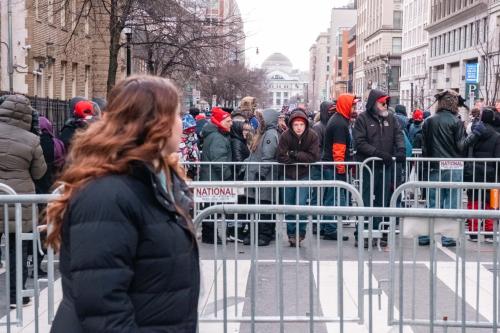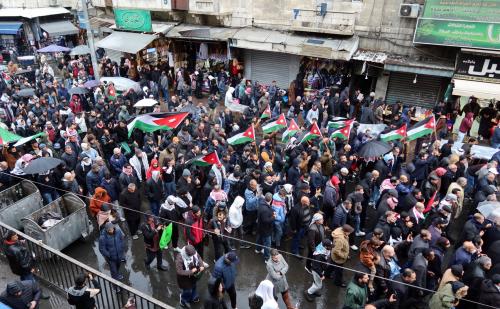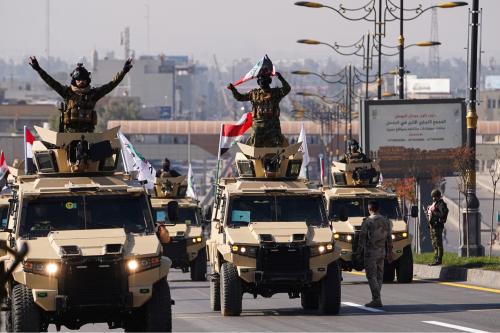In late April, the United States presented to the G-8 “sherpas” a new set of proposals for a Greater Middle East Initiative (GMEI) to be adopted by the eight industrialized nations at their June summit in Sea Island, Georgia.* The initiative is part of President Bush’s “forward strategy of freedom,” by which the expansion of political rights and political participation in the Muslim world is meant to combat the appeal of Islamist extremism. The new draft proposals reflect real transatlantic engagement on the issue, but major differences in approach between the United States and its European partners remain. Moreover, as the debate over reform ripens within the Middle East, the G-8 proposals may run up against an increasingly wide gap between the reform visions articulated by Arab liberals and those articulated by some of the more hidebound Arab governments. How the G-8 proposals relate to this divergent discourse within the region will affect the credibility of all the G-8 states as they attempt to implement a pro-reform agenda in the Middle East.
Recognizing that external pressure for internal political change is always a difficult proposition, the more so in this case given America’s negative image in the Muslim world, the Bush Administration has sought the support of European and other western countries for its project of region-wide democracy promotion. But the American initiative ran into stiff opposition from the outset. European governments are keen to protect their own reform initiatives, such as the European-Mediterranean dialogue begun in Barcelona in 1995 (which is focused on the Mediterranean littoral states rather than the “Greater Middle East,” which stretches from Morocco to Pakistan). They are also skeptical that democracy can take root in the Middle East without significant changes in culture and society, so they prefer to speak of “modernization” rather than “democratization.” Finally, European governments view the resentments and tensions in the Muslim world as rooted as much in the continued crises in Iraq and between Israelis and Palestinians as in Arabs’ lack of freedom. They therefore emphasize the urgency and necessity of attention to the Middle East peace process parallel to pressure on Arab states for internal reforms.
An early draft of the US proposal was leaked in February to an Arabic newspaper, al-Hayat, raising an outcry among Arab leaders that America was attempting to impose external political models on the region. The State Department was compelled to spend its time reassuring Arab governments that this was not the case, instead of lobbying for its initiative. European governments responses to the proposal emphasized four key themes: the GMEI must not be viewed by Arabs as an imposition but rather must be a “partnership” between the region and the G-8; it must reflect and sustain a long-term commitment to the region and to the process of reform; it must be “inclusive”; and it must adopt a country-by-country approach, rather than a region-wide template.
The new American draft responds to European concerns about the project and, in a bow to Arab criticisms, is rooted in indigenous Arab calls for reform. The draft proposal includes five core components:
- A “Greater Middle East Forum for the Future” would provide a regular venue for discussion of reform goals and programs, and to promote cooperation between states on behalf of reform. The forum would also include business and civil society leaders to facilitate coalition-formation between these groups on behalf of reform efforts.
- A Greater Middle East Democracy Assistance Group would coordinate the efforts of the various American, European, and other foundations that sponsor non-governmental programs to build democracy. The National Endowment for Democracy and the German party-affiliated Stiftungs, for example, would participate in a concerted effort to maximize the effectiveness of their joint and independent programs in the region.
- A Greater Middle East Foundation for Democracy would go one step further, establishing a multilateral foundation modeled on the National Endowment for Democracy and focused on the Middle East.
- A Greater Middle East Literacy Corps would address one of the least controversial and most fundamental barriers to citizen participation in governance.
- A G-8 Microfinance Pilot Project would focus an existing French proposal for a microfinance initiative on the Middle East. By funding new small businesses across the region, the project hopes to build the middle-class foundation that democracies need to survive.
In addition to these concrete projects, the new proposal also lists “notional elements” that together form a broad array of pro-reform programs. These elements include civic education programs, parliamentary exchanges, women’s leadership workshops, legal aid, media training, anti-corruption efforts, and labor union support. Each element is backed up by quotations from recent non-governmental calls for reform—the Sana’a Declaration, the Alexandria Document, and the Arab Business Council communiqué—that have emanated from the Middle East.
EVALUATION
It is clear from the new draft that other countries have begun to contribute ideas to the GMEI, although their ideas may be smaller in scale or less focused on political reform than the American ideas. The new draft also addresses two key concerns raised by European G-8 members. Responding to the European demand for reform to come through partnership, the new draft sets up the “Forum for the Future” as a mechanism for dialogue on reform between the West and the Middle East, but one that gives non-governmental actors a seat at the table. The new draft also answers the call of President Bush and others for a generational commitment to democracy in the Greater Middle East, by embedding its small-bore programs in a network of new institutions with their own funding and capacity. Such institutions, once created, might begin to take on a life and logic of their own, and with luck can insulate the project of democracy promotion in the Middle East from the swings of political fortune that have often doomed similar efforts in the past. While some G-8 partners may balk at the creation of so many new multilateral institutions, such components are what ensure that the GMEI is built in a way that is sustainable over the long term.
THE NEW GMEI PROPOSAL AND TRANSATLANTIC RELATIONS
The GMEI, as embodied in this new draft, still must overcome a fundamental difference of opinion between America and her western allies about the urgency and necessity of the reform project at a time of mounting crisis in Iraq and Israel/Palestine. While European officials, such as German Foreign Minister Joschka Fischer, have expressed the same concerns as President Bush about Arab stagnation fueling radicalism that threatens western interests, Fischer and others argue that the Arab-Israeli conflict is also a major source of radicalization, and therefore deserves equal attention to reform.
Moreover, European governments tend to emphasize the need for economic and social changes in the Arab world to precede any significant pressure for democratization. Shaped by the meager returns from their human rights and good-governance agenda in the Barcelona process, European governments tend to believe that cooperation in education, trade, and other areas is a prerequisite to major political reform, and that poverty and underdevelopment must be addressed before one can expect meaningful political participation. Socioeconomic modernization, of course, is a gradual process that is less responsive to concerted external pressure than political reform. Consequently (and conveniently), a modernization approach in the GMEI is less likely to provoke Arab government resistance than focused attention to democratic deficits such as emergency decrees, arbitrary detention, and press intimidation.
Even if valid in the case of relations between the Middle East and the West, relying on functional cooperation and economic development to produce political change is a very long-term strategy in an environment of tangible threats and mounting anti-western sentiment. To the extent that a socioeconomic focus was appropriate in an era when the main European concern about stagnation on its Arab southern periphery was that such stagnation would produce migrant labor flows to European countries, that focus may no longer be as relevant to a post-Madrid world, when anti-western terrorism is the primary threat.
But the lingering difference in emphasis in US and European nations on the urgency and necessity of the reform project mirrors in many ways the different perceptions of the urgency of the Iraqi threat prior to the war there. There is also the possibility that sustained transatlantic tensions over Iraq and the Middle East peace process are now making European governments less inclined to narrow differences and find harmony with the Bush Administration over the GMEI. All this suggests an enduring gap that will continue to bedevil US-European cooperation on security issues in the Greater Middle East. Contrary to the fondest wishes of transatlantic enthusiasts, Middle Eastern reform may not be a good issue through which to bridge the post-Iraq chasm between the United States and Europe; it may even widen it.
THE GMEI PROPOSAL AND ARAB POLITICS: THE TUNIS SUMMIT
In late May, before the G-8 convenes, the League of Arab States will hold their (rescheduled) annual summit. At that meeting, the Arab monarchs and presidents will have to decide what attitude they will jointly take toward the new, but apparently sincere and determined, American interest in reform of their sclerotic internal politics.
Up until now, the Bush Administration’s rhetoric on Middle Eastern democracy has been far ahead of its policy, leading many Arab governments to wonder whether they needed to bother responding at all to American calls for reform that might, they suggested, simply be an election-year distraction from the troubles in Iraq. The February draft leaked to al-Hayat was sufficiently embryonic that some Arab leaders still argued, in the run-up to the aborted Arab summit (it was to have convened on March 29 in Tunis), that they could safely ignore it. Syria, typically, held down the denial-and-rejection pole (we don’t have a problem, and if we do we don’t want your help to solve it), with some support from Saudi Arabia and Egypt. Jordan, Qatar, and some North African governments pressed instead for a strong pro-reform statement, arguing that only a credible Arab embrace of the issue would preempt Washington and prevent it from issuing its own reform agenda for Arab states.
Disagreements on what, if anything, the Arab governments should jointly say about reform are precisely what led to the last-minute cancellation of the Arab League summit. The failure to achieve a unified Arab stance, especially in the face of mounting American pressure and clearly articulated demands from citizen groups, made the Arab governments look increasingly out of touch with reality.
Complicating Arab government deliberations at the Tunis summit is the recent proliferation of non-governmental reform conferences convening in the Middle East, many of which are producing their own, rather explicit, calls for reform of political, economic and social institutions. The combination of declining economic, political, and security conditions in the region and escalating western attention to them have emboldened the Arab world’s fledgling liberal movement, producing non-governmental calls for reform that are unprecedented in their number, comprehensiveness, and explicit focus on democracy and freedom. One notable example was a conference convened at the Alexandria Library in Egypt in March, which produced a document demanding the cancellation of emergency laws, the lifting of restrictions on speech and association, and the transfer of authority from Arab states’ traditionally dominant executive branch to elected legislatures and an independent judiciary.
The increasingly public and fertile discussion of reform across the region strongly suggests that liberals in the Arab world, long resigned to working within their flawed systems, are increasingly claiming an independent voice in the debate. Moreover, it suggests that discussion of the need for reform and its nature is no longer something that even the most recalcitrant Arab leaders can avoid. Thus, Egypt’s Hosni Mubarak gave his official blessing to the Alexandria reform conference—though he carefully avoided comment on its conclusions.
FROM TUNIS TO SEA ISLAND: HARD CHOICES AWAIT
The new GMEI draft reveals that the United States is no longer alone in its quest to address the region’s acknowledged deficits in freedom, knowledge, and women’s empowerment, but has engaged its European allies in a fruitful discussion of how to go about promoting reform. While the resulting proposals are modest, they will, at a minimum, supplement and provide multilateral endorsement for what may emerge as more aggressive unilateral American democracy projects. With the new draft proposals, the United States has thus begun to transform its rhetorical commitment into a policy that could have a life-span beyond the November elections.
But transatlantic differences of opinion and other ambiguities in the goal of reform have resulted in a GMEI that comprises a long menu of programs and ideas on issues both controversial and mundane. Much like the Bush Administration’s Middle East Partnership Initiative, this menu will allow Arab governments to focus their “partnership” on issues more palatable to them and reject or ignore those that are unpalatable. A “cafeteria plan” for Middle Eastern reform is not likely to be effective in any of its core goals.
Thus far the United States, and the G-8 as a whole, have managed to avoid a central question in their quest to build a “partnership” for Arab reform: with whom do they seek to partner? Some argue that Arab civil society is too weak to serve as a partner, so that governments must be the main engine of reform. All of the G-8 countries are concerned with preserving Arab state cooperation in the war on terrorism, oil price stability, and other core issues. There is strong pressure to find a consensual path to government-led reform and give a secondary position to the still marginal voices of Arab liberal activists. At the same time, there is widespread recognition that only a few Arab regimes truly grasp the magnitude of the challenges they face and the changes required to face them – more common is the fear that significant shifting of economic and political power out of their hands will endanger their continued rule. Thus, if the West is serious about the need for reform, it may need to press some Arab governments well beyond their comfort level. While the draft GMEI suggests some small incentives for Arab governments to engage with the G-8 on reform questions, it does not address the concomitant need for G-8 states, singly or together, to develop a menu of positive and negative inducements for those Arab governments that will not take sufficient account of the West’s security imperative in favor of Arab reform.
The echoing, in the American draft, of the Alexandria document and other non-governmental reform papers suggests that the United States is not willing to wait forever for Arab regimes to sign on to the reform ideas championed, increasingly vocally, by their own citizens. European governments, for their part, strongly prefer to work government-to-government and thus seem prepared to accept as a basis for cooperation whatever tepid reform statement upon which the fractious Arab League can agree.
But the contrast between Arab liberals’ calls to action and the denial and dithering of many Arab leaders is growing ever starker. A failure by the United States and its G-8 partners to welcome these voices, or a western embrace of government visions of gradual reform over the liberals’ democratic agenda, will further demolish America’s credibility in the region and make it even more likely that the successors to the current generation of Arab autocrats will be decidedly anti-American in orientation. President Bush made a point of acknowledging, last November, the error in America’s past support of Arab dictators—but if the United States hews to top-down, government-led reform projects that do not produce greater political freedom for Arab citizens, then it will be repeating its past mistakes.
If Arab governments refuse to endorse a robust reform agenda at the Tunis summit, then the G-8 may face a painful choice in June: to follow the path of least resistance with Arab governments, and thereby to break faith with Arab liberals and others pressing for freedom and democracy; or to embrace the reform vision articulated by Arab activists, and thereby enter an era of greater tension and confrontation with Arab regimes on this and perhaps other important issues. As the lines of the reform battle within the Middle East become increasingly clear, it becomes more difficult for the United States and its western allies to avoid clarifying which side they are on.
*The new draft has not been publicly released, but has been described in the Washington Post, Financial Times and Los Angeles Times and widely circulated to foreign governments and non-governmental organizations for comment. This article is based on a copy of the GMEI text acquired from a non-American source. Surprisingly, given the controversy generated by the leak of the first draft, the new draft has not generated significant media discussion.
The Brookings Institution is committed to quality, independence, and impact.
We are supported by a diverse array of funders. In line with our values and policies, each Brookings publication represents the sole views of its author(s).



